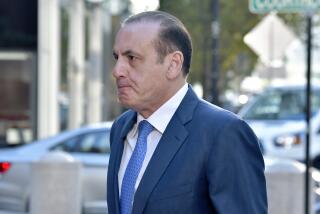Defense Cites Low Salaries in Honda Bribery Trial : Courts: Prosecutors, in closing arguments, say greed motivated executives to seek kickbacks for supplies of cars.
- Share via
CONCORD, N.H. — Jurors were asked Thursday to decide whether it was greed or poor salaries that led two former American Honda Motor Co. executives to take part in one of the biggest bribery and kickback cases in the American auto industry.
Prosecutors told jurors in closing arguments that greed led the former executives to accept bribes of hot tubs, swimming pools, jewelry and expensive clothes from Honda dealers in exchange for ample supplies of fast-selling cars during the 1980s.
Defense attorneys said the men--Dennis Josleyn of Penn Valley, Calif., and John Billmyer of Raleigh, N.C.--took gifts to supplement their poor salaries from Honda and that the company condoned the practice.
The two are accused of taking part in a bribery-kickback scheme that provided choice dealerships and generous allocations of scarce cars to favored dealers in return for gifts. Josleyn also is charged with receiving kickbacks from sales training and advertising schemes.
Prosecutors say that dealers in 30 states paid about $15 million in cash and gifts to a variety of American Honda executives, including former top Honda sales executive Stanley James Cardiges of Laguna Hills.
Cardiges alone was accused of scooping up $5 million of the bribes. He became the prosecution’s key witness after pleading guilty earlier this year to racketeering, conspiracy and fraud. He is one of 16 former Honda executives who have entered guilty pleas. Three dealers and a lawyer also have pleaded guilty to charges.
The trial began in February, but an appeal of a ruling on evidence caused a long break. Jurors are scheduled to begin deliberations today.
In closing arguments, U.S. Atty. Michael Connolly reminded the jury that Hondas were in such high demand during the 1980s that dealers were selling them for thousands of dollars above their sticker prices. Much of the inflated prices went to Honda executives in kickbacks, he argued.
“As time went on, greed became a more powerful force. The payments got richer and richer,” Connolly told jurors in the federal trial in Concord. “The facts show that these men were stealing money from American Honda and were hiding it.”
Prosecutors have called American Honda the principal victim because it faces millions of dollars in lawsuits by dealers who did not receive preferential treatment.
The company has said it knew nothing about the payments, but Josleyn’s lawyers tried to show that American Honda considered the payoffs compensation for poor salaries.
“They made the decision to let employees take kickbacks from dealers. They made that bed. It’s time for you to tuck them into that bedroom,” said Paul Twomey, attorney for Josleyn.
Twomey attacked the credibility of Cardiges, once the most powerful sales executive with the company. “This case is built on a foundation of sewage, of lies,” he said in reference to Cardiges.
He told jurors American Honda tried to cover its complicity by encouraging current and past employees to lie, and he said prosecutors did not call certain Honda executives because they did not want the jury to hear the truth.
But Connolly shot back: “There is not one shred of evidence we covered up a single thing.” He asked the jurors to “stick with the facts in the case” and not be seduced by “rumor and innuendo” of a broader conspiracy among higher-ups at Honda.






